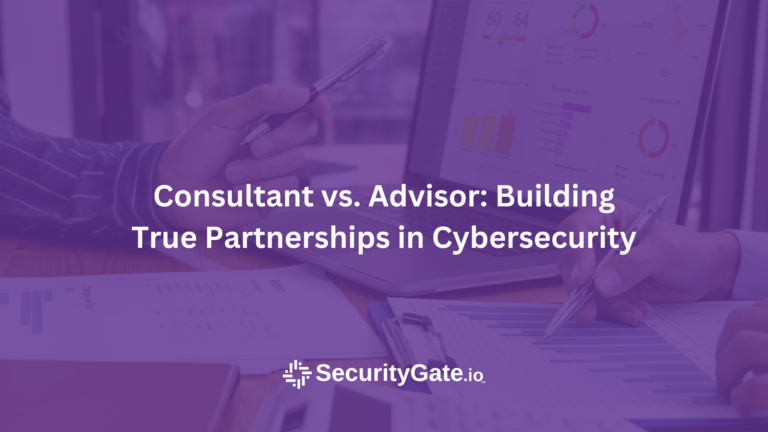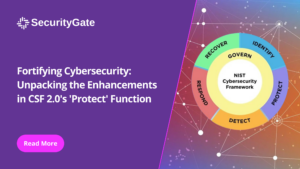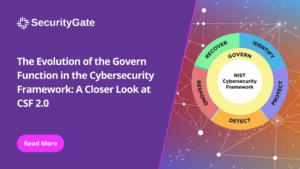In today’s ever-evolving cybersecurity landscape, organizations need expert guidance to safeguard their critical assets, sensitive data, and systems. Having a trustworthy and reliable partner is essential. While “consultant” and “advisor” are often used interchangeably, significant differences highlight the importance of building long-term relationships with cybersecurity solution providers. At SecurityGate, we pride ourselves on being genuine partners to our customers, taking a proactive approach that prioritizes continuous improvement over time. In this article, we will clarify the distinctions between being a consultant and an advisor and explain how we help our customers connect cybersecurity decisions with their corporate business objectives and key results.
Goals
Organizations commonly hire consultants for short-term projects to address specific issues. Consultants provide recommendations or implement solutions within a limited scope. However, when it comes to a more comprehensive approach and focusing on long-term goals, advisors such as SecurityGate are the way to go. To develop sustainable cybersecurity strategies, advisors consider an organization’s current situation, plans, and industry trends. This results in explaining the reasoning behind investments rather than offering quick fixes.
Thought Processes
Consultants often excel at executing specific tasks or projects, providing specialized expertise within a narrow domain. They focus on tactical decision-making, solving immediate problems without necessarily considering broader implications or long-term consequences. In contrast, an advisor will adopt a strategic mindset to understand the organization’s cybersecurity posture and align it with business objectives. This approach allows for more informed decision-making, ensuring security measures align with the organization’s evolving needs and risk landscape.
Relationships
Consultants are usually hired for specific projects, so their relationships with clients may not continue after the project is done. Although they can offer valuable expertise and insights, their involvement usually ends once the project is completed. On the other hand, advisors develop collaborative relationships that go beyond the initial engagement. They devote their time and energy to comprehending their customers’ unique challenges, cultures, and objectives while gaining trust and a thorough understanding of their cybersecurity needs.
Approaches
Consultants are often brought in to address specific issues or challenges, responding reactively to incidents or compliance requirements. They focus on solving problems as they arise rather than proactively identifying and mitigating potential risks. Conversely, Advisors adopt a proactive stance, continuously monitoring the threat landscape, industry best practices, and regulatory changes. Providing ongoing guidance and support, they help organizations stay ahead of emerging threats, strengthen their security posture, and adapt to evolving compliance standards.
Continuous Improvement vs. One-time Solutions
Consultants typically deliver recommendations or implement solutions within a fixed timeframe, often resulting in a one-time, static outcome or snapshot. Advisors or a true partner like SecurityGate will prioritize continuous improvement over time. By assessing the effectiveness of implemented measures, monitoring evolving risks, adapting security strategies accordingly, and showcasing value by demonstrating security maturity over time. Advisors ensure that organizations remain resilient in the face of ever-changing cybersecurity threats.
Imagine driving across town and running into a roadblock. With a consultant, you can call them, and they may provide the right way to get around the roadblock and get you back on the correct path. An advisor is more of a co-pilot riding in the passenger seat with you. They can identify the roadblocks ahead and check traffic and weather conditions around you to ensure you stay on the same course.
In cybersecurity, it’s crucial to distinguish between consultants and advisors. While consultants can provide valuable insights and recommendations for specific projects or tasks, partnering with a trusted advisor like SecurityGate can yield more enduring benefits. Advisors can collaborate with organizations on strategic alignment, continuous improvement, and teamwork, taking a forward-thinking approach to cybersecurity. This can help organizations confidently navigate the intricacies of cyber security and demonstrate successful outcomes to their executive team and board, ensuring their triumph in a swiftly evolving digital world.






